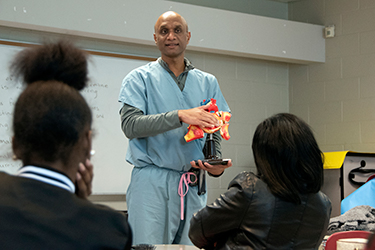 Harish Doppalapudi, MD (Associate Professor, Cardiovascular Disease) recently participated in an exciting community education partnership with UAB Heersink School of Medicine students which presented a "Heart Clinic" to tenth-graders at George Washington Carver High School. The highlight was the hands-on portion of the workshop where each high-schooler was able to learn and practice taking a blood pressure reading. This program is part of the Academies of Birmingham initiative which prepares students in Birmingham city schools for college and professional careers.
Harish Doppalapudi, MD (Associate Professor, Cardiovascular Disease) recently participated in an exciting community education partnership with UAB Heersink School of Medicine students which presented a "Heart Clinic" to tenth-graders at George Washington Carver High School. The highlight was the hands-on portion of the workshop where each high-schooler was able to learn and practice taking a blood pressure reading. This program is part of the Academies of Birmingham initiative which prepares students in Birmingham city schools for college and professional careers.
More Good News for November 28, 2018
Orlando Gutierrez, MD (Professor, Nephrology) has been selected for membership in the American Society for Clinical Investigation, an honor society of physician-scientists, who translate findings in the laboratory to the advancement of clinical practice. His research has provided novel insights in understanding the progression of kidney disease and bone disorders in patients with kidney failure. Congratulations!
Elizabeth Jackson, MD (Professor, Cardiovascular Disease) has written a summary of the U.S. Department of Health and Human Services updated 2018 Physical Activity Guidelines for Americans, which provides information and guidance on the types and amounts of physical activity that provide substantial health benefits. It is available on the American College of Cardiology's web site.
The Acute Care for Elders Unit was recently featured on an episode of “Aging Matters.” The video aired on PBS Nashville and included special interviews with our department chair, Seth Landefeld, MD and founding ACE Unit Medical Director, Kellie Flood, MD (Associate Professor, Gerontology, Geriatrics and Palliative Care). The ACE Unit utilizes an interdisciplinary care team trained in geriatrics to provide acutely ill older adults with holistic care, that promotes health, prevents complications, optimizes function and preserves dignity.
Bryan Becker, PhD (Nephrology Fellow) has been awarded a two year post-doctoral fellowship, “Role of Renal Sensory Nerved in Mediating Hypertension” from the American Heart Association. His mentor is Professor David Pollock, PhD.
Elizabeth McAlister (Program Coordinator, Geriatrics, Palliative Care, and Rheumatology Fellowships) has been certified by the Training Administrators of Graduate Medical Education board. This robust certification process that provides a national standard to assess the knowledge, skills and abilities of training administrators of graduate medical education programs. Kudos, Elizabeth!
Faculty and staff in the Department of Medicine came together for the Love Your Lungs event hosted by UAB Employee Wellness at The Kirklin Clinic on November 15. As part of the American Cancer Society's annual Great American Smokeout, this event advocated for lung health and provided resources to help people stop smoking. There was even a pair of 50-foot inflatable lungs! #UABWell
Coming next week to Medical Grand Rounds
Michael Wells, MD (Associate Professor, UAB Division of Pulmonary, Allergy and Critical Care), will present the Annual Alex Litz, MD, Memorial Lecture, “Meeting Unmet Needs in Alpha-1 Antitrypsin Deficiency” at noon on December 5, 2018, in Margaret Cameron Spain Auditorium.
Annoucements:
- Mark your calendars for the “Scourge: Diseases That Shaped History” art exhibition that opens on December 3 at Reynolds-Finley Historical Library. The exhibition will feature three historic epidemics and how they shaped history. In addition to the exhibit, Mike Saag, MD, will deliver a special guest lecture on “The Art of ART (Antiretroviral Therapy)” from 11 to 12:30 p.m. on Tuesday, December 4, in Project Space, on the first floor of the UAB Humanities Building.
- Anath Shalev, MD, (Professor, Endocrinology, Diabetes and Metabolism) was named the School of Medicine’s Featured Discovery honoree for the month of November. The findings, published by Nature Medicine, reveal that regular oral administration of verapamil, a common blood pressure medication first approved for medical use in 1981, enabled patients to produce higher levels of their own insulin, limiting their need for injected insulin to control their blood sugar levels. Congrats Dr. Shalev!